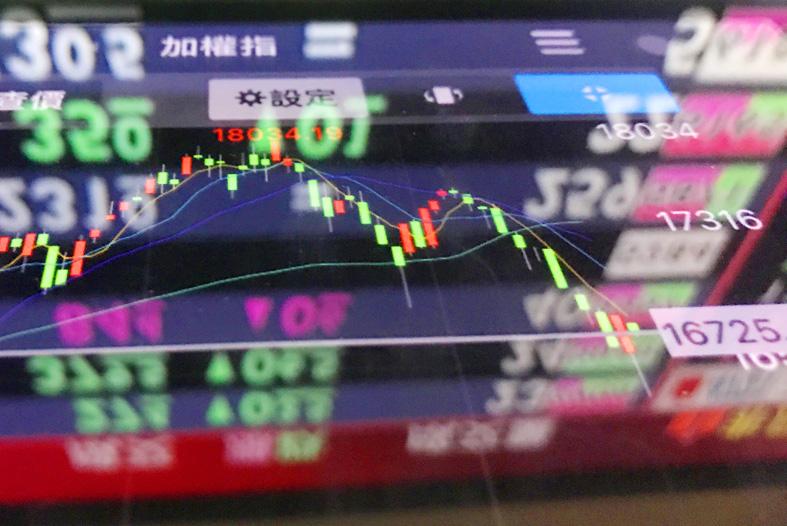The Cabinet yesterday approved a proposal to extend a 50 percent tax cut for day trading transactions for another three years, saying that the measure has played an important role in invigorating the local stock market’s turnover and liquidity.
The bill, which must still be approved by the legislature, was the result of cross-ministerial negotiations a day earlier to iron out differences between the Ministry of Finance and the Financial Supervisory Commission (FSC).
The commission had pushed for a five-year extension to boost the local exchange and benefit the national treasury, but the ministry favored a shorter extension, as critics have questioned the fairness of the tax cut and voiced concerns over a potential speculation frenzy.

Photo: CNA
An ongoing stock rout hastened consensus-building, but failed to reverse the retreat in the TAIEX, which yesterday shed another 2.68 percent, or 450.87 points, to 16,375.40 on turnover of NT$431.276 billion (US$15.42 billion), Taiwan Stock Exchange data showed.
The volume this month tumbled from a daily average of NT$652.3 billion last month, it showed.
The ministry yesterday said it approved a proposal to extend the tax cut because trading has not grown out of control, but rather substantially energized the local exchange after the tax rate was reduced from 0.003 percent to 0.0015 percent.
Daily turnover was a modest NT$98.75 billion in 2016, with day trading generating NT$10.57 billion, or 9.6 percent, the FSC said.
The practice grew rapidly to NT$37.46 billion per day, accounting for 22.3 percent of TAIEX turnover of NT$154.41 billion in the first year after the tax cut in April 2017, the commission said.
The data showed that the tax cut had a positive impact on the relationship between day trading and daily turnover, which merited an extension of the scheme to maintain the health of the local stock market, the FSC said.
Day trading soared to 45 percent of daily turnover last month and contributed NT$451 million per day to the state coffers, much higher than NT$56 million before the tax cut, the ministry said.
Day trading accounts spiked this year, with 100,000 accounts added from January to April, 200,000 in May and 212,400 last month, data showed, as a nationwide level 3 COVID-19 alert drove interest in securities investments.
The FSC said that day trading could help lower investment risks, as it allows investors to correct mistakes on the same day.
The ministry first agreed to a tax cut for a year and later extended it through the end of this year to help the local capital market.
The ministry and the commission said they would meet with lawmakers to facilitate the passage of the tax cut.

‘FORM OF PROTEST’: The German Institute Taipei said it was ‘shocked’ to see Nazi symbolism used in connection with political aims as it condemned the incident Sung Chien-liang (宋建樑), who led efforts to recall Democratic Progressive Party (DPP) Legislator Lee Kun-cheng (李坤城), was released on bail of NT$80,000 yesterday amid an outcry over a Nazi armband he wore to questioning the night before. Sung arrived at the New Taipei City District Prosecutors’ Office for questioning in a recall petition forgery case on Tuesday night wearing a red armband bearing a swastika, carrying a copy of Adolf Hitler’s Mein Kampf and giving a Nazi salute. Sung left the building at 1:15am without the armband and apparently covering the book with a coat. This is a serious international scandal and Chinese

PERSONAL DATA: The implicated KMT members allegedly compiled their petitions by copying names from party lists without the consent of the people concerned Judicial authorities searched six locations yesterday and questioned six people, including one elderly Chinese Nationalist Party (KMT) member and five KMT Youth League associates, about alleged signature forgery and fraud relating to their recall efforts against two Democratic Progressive Party (DPP) legislators. After launching a probe into alleged signature forgery and related fraud in the KMT’s recall effort, prosecutors received a number of complaints, including about one petition that had 1,748 signatures of voters whose family members said they had already passed away, and also voters who said they did not approve the use of their name, Taipei Deputy Chief Prosecutor

UNDER ATTACK: Raymond Greene said there were 412 billion malicious threats in the Asia-Pacific region in the first half of 2023, with 55 percent targeting Taiwan Taiwan not only faces military intimidation from China, but is also on the front line of global cybersecurity threats, and it is taking action to counter those attacks, President William Lai (賴清德) said yesterday. Speaking at the opening of this year’s Cybersec Expo in Taipei, the president assured foreign diplomats and exhibitors that Taiwan remained committed to strengthening its defense against cyberattacks and enhancing the resilience of its digital infrastructure. Lai referenced a report from the National Security Bureau (NSB) indicating that the Government Service Network faced an average of 2.4 million intrusion attempts daily last year, more than double the figure

COUNTERINTELLIGENCE TRAINING: The ministry said 87.5 percent of the apprehended Chinese agents were reported by service members they tried to lure into becoming spies Taiwanese organized crime, illegal money lenders, temples and civic groups are complicit in Beijing’s infiltration of the armed forces, the Ministry of National Defense (MND) said in a report yesterday. Retired service members who had been turned to Beijing’s cause mainly relied on those channels to infiltrate the Taiwanese military, according to the report to be submitted to lawmakers ahead of tomorrow’s hearing on Chinese espionage in the military. Chinese intelligence typically used blackmail, Internet-based communications, bribery or debts to loan sharks to leverage active service personnel to do its bidding, it said. China’s main goals are to collect intelligence, and develop a